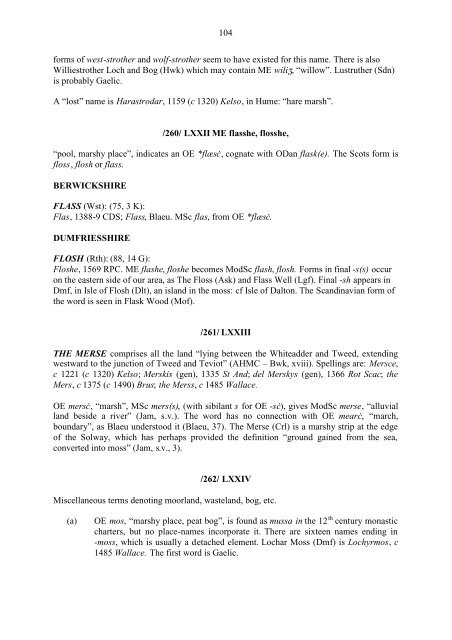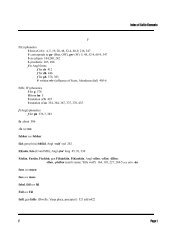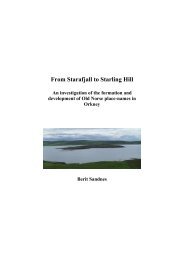May Williamson: The Non-Celtic Place-Names of the Scottish Border ...
May Williamson: The Non-Celtic Place-Names of the Scottish Border ...
May Williamson: The Non-Celtic Place-Names of the Scottish Border ...
You also want an ePaper? Increase the reach of your titles
YUMPU automatically turns print PDFs into web optimized ePapers that Google loves.
104<br />
forms <strong>of</strong> west-stro<strong>the</strong>r and wolf-stro<strong>the</strong>r seem to have existed for this name. <strong>The</strong>re is also<br />
Williestro<strong>the</strong>r Loch and Bog (Hwk) which may contain ME wiliZ, “willow”. Lustru<strong>the</strong>r (Sdn)<br />
is probably Gaelic.<br />
A “lost” name is Harastrodar, 1159 (c 1320) Kelso, in Hume: “hare marsh”.<br />
/260/ LXXII ME flasshe, flosshe,<br />
“pool, marshy place”, indicates an OE *flæsċ, cognate with ODan flask(e). <strong>The</strong> Scots form is<br />
floss, flosh or flass.<br />
BERWICKSHIRE<br />
FLASS (Wst): (75, 3 K):<br />
Flas, 1388-9 CDS; Flass, Blaeu. MSc flas, from OE *flæsċ.<br />
DUMFRIESSHIRE<br />
FLOSH (Rth): (88, 14 G):<br />
Floshe, 1569 RPC. ME flashe, floshe becomes ModSc flash, flosh. Forms in final -s(s) occur<br />
on <strong>the</strong> eastern side <strong>of</strong> our area, as <strong>The</strong> Floss (Ask) and Flass Well (Lgf). Final -sh appears in<br />
Dmf, in Isle <strong>of</strong> Flosh (Dlt), an island in <strong>the</strong> moss: cf Isle <strong>of</strong> Dalton. <strong>The</strong> Scandinavian form <strong>of</strong><br />
<strong>the</strong> word is seen in Flask Wood (M<strong>of</strong>).<br />
/261/ LXXIII<br />
THE MERSE comprises all <strong>the</strong> land “lying between <strong>the</strong> Whiteadder and Tweed, extending<br />
westward to <strong>the</strong> junction <strong>of</strong> Tweed and Teviot” (AHMC – Bwk, xviii). Spellings are: Mersce,<br />
c 1221 (c 1320) Kelso; Merskis (gen), 1335 St And; del Merskys (gen), 1366 Rot Scac; <strong>the</strong><br />
Mers, c 1375 (c 1490) Brus; <strong>the</strong> Merss, c 1485 Wallace.<br />
OE mersċ, “marsh”, MSc mers(s), (with sibilant s for OE -sċ), gives ModSc merse, “alluvial<br />
land beside a river” (Jam, s.v.). <strong>The</strong> word has no connection with OE mearċ, “march,<br />
boundary”, as Blaeu understood it (Blaeu, 37). <strong>The</strong> Merse (Crl) is a marshy strip at <strong>the</strong> edge<br />
<strong>of</strong> <strong>the</strong> Solway, which has perhaps provided <strong>the</strong> definition “ground gained from <strong>the</strong> sea,<br />
converted into moss” (Jam, s.v., 3).<br />
/262/ LXXIV<br />
Miscellaneous terms denoting moorland, wasteland, bog, etc.<br />
(a)<br />
OE mos, “marshy place, peat bog”, is found as mussa in <strong>the</strong> 12 th century monastic<br />
charters, but no place-names incorporate it. <strong>The</strong>re are sixteen names ending in<br />
-moss, which is usually a detached element. Lochar Moss (Dmf) is Lochyrmos, c<br />
1485 Wallace. <strong>The</strong> first word is Gaelic.




